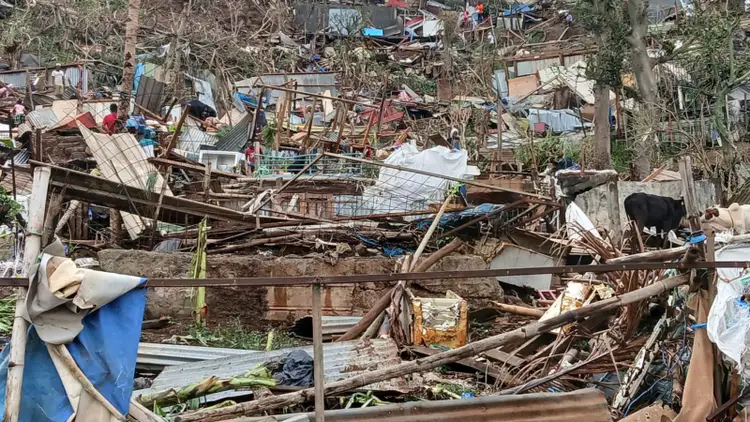Close to 1,000 people feared dead after cyclone in Mayotte

According to the island's top official, nearly 1,000 individuals could have lost their lives following the impact of Cyclone Chido on Mayotte in the Indian Ocean.

Francois-Xavier Bieuville, the Prefect of Mayotte, stated in an interview with local TV station la 1ere, “I believe the death toll could be several hundred, possibly reaching close to a thousand or even more, considering the severity of this incident.”
He mentioned that it's very challenging at the moment to determine a precise figure.
Authorities had verified that at least 11 people had died in Mayotte, a French overseas department, earlier on Sunday, but they indicated that this number is likely to rise.
Cyclone Chido caused significant destruction on Saturday, impacting not only the region it hit but also the nearby islands of Comoros and Madagascar as it moved through the southeastern Indian Ocean.
Meteorological agency Meteo-France reported that this storm is the most powerful to strike the islands in over 90 years.
Winds exceeding 136 mph tore roofs from homes and caused significant damage to structures in Mayotte.

Whole neighborhoods were completely destroyed, with residents noting that numerous trees had been knocked down and boats had either capsized or submerged.
The primary airport and hospital experienced significant destruction, stated the newly appointed French Prime Minister, Francois Bayrou.
He mentioned that numerous individuals residing in unstable shanties in impoverished neighborhoods have encountered significant dangers.
A hospital in Mayotte indicated that nine individuals were in a serious state, while an additional 246 were wounded.
However, the interior ministry of France mentioned that tracking an exact count of the casualties has been challenging. Interior Minister Bruno Retailleau expressed concern that the death toll "will be substantial."
The ministry announced that 1,600 police and gendarmerie personnel have been sent to the area, along with rescue teams and firefighters from Mayotte and the nearby Reunion Island. Essential supplies are also being quickly transported using military planes and ships.

Mayotte is home to a population of slightly more than 300,000 people, residing on two primary islands located around 500 miles from the eastern coastline of Africa.
It is the most economically disadvantaged area in France, facing challenges like prolonged drought, lack of investment, and gang-related violence for many years.
This content is provided by X, which may utilize cookies and other technologies. To display this content, we require your authorization to use cookies. You can use the buttons below to adjust your preferences, either to accept X cookies or to grant permission for those cookies for a single session. You can modify your preferences at any time in the Privacy Options. Unfortunately, we haven't been able to confirm whether you have agreed to X cookies. To access this content, please use the button below to allow X cookies for this session only.
Cyclone Chido has officially reached the shore in Mozambique on the African continent. According to the United Nations Children's Fund (UNICEF), the Cabo Delgado region, which is inhabited by approximately two million residents, has suffered greatly from the storm.

The organization stated that numerous houses, schools, and healthcare centers have either been significantly damaged or completely ruined, and they are collaborating closely with the government to maintain the delivery of essential services.
"Although we are making every effort possible, extra help is urgently required."
Guy Taylor, a spokesperson for UNICEF Mozambique, mentioned in a video that communities might soon find themselves isolated from schools and healthcare services for several weeks.
This content is supplied by X, which might be using cookies and similar technologies. To display this content, we require your permission to use cookies. You can adjust your preferences using the buttons below to enable cookies from X or allow them for this session only. You can change your settings anytime through the Privacy Options. Unfortunately, we can't confirm if you've agreed to the use of X cookies. If you want to view this content, you can click the button below to permit X cookies just for this session.

Malawi and Zimbabwe have prepared emergency measures, with officials in both nations indicating that they might need to relocate residents from flood-prone regions.
From December to March, the southeastern Indian Ocean experiences cyclone season, and southern Africa has faced several intense storms during the past few years.
In 2019, Cyclone Idai claimed the lives of over 1,300 individuals in Mozambique, Malawi, and Zimbabwe. Last year, Cyclone Freddy also had a devastating impact, resulting in the deaths of more than 1,000 people across multiple nations.
Cyclones pose a threat of flooding and landslides, but they can also create still bodies of water that could later lead to dangerous outbreaks of waterborne illnesses like cholera, as well as diseases such as dengue fever and malaria.
Research indicates that cyclones are becoming more severe due to climate change. This situation forces low-income countries in southern Africa, which contribute very little to global warming, to face significant humanitarian challenges. It emphasizes their plea for increased assistance from wealthier nations to cope with the effects of climate change.













































